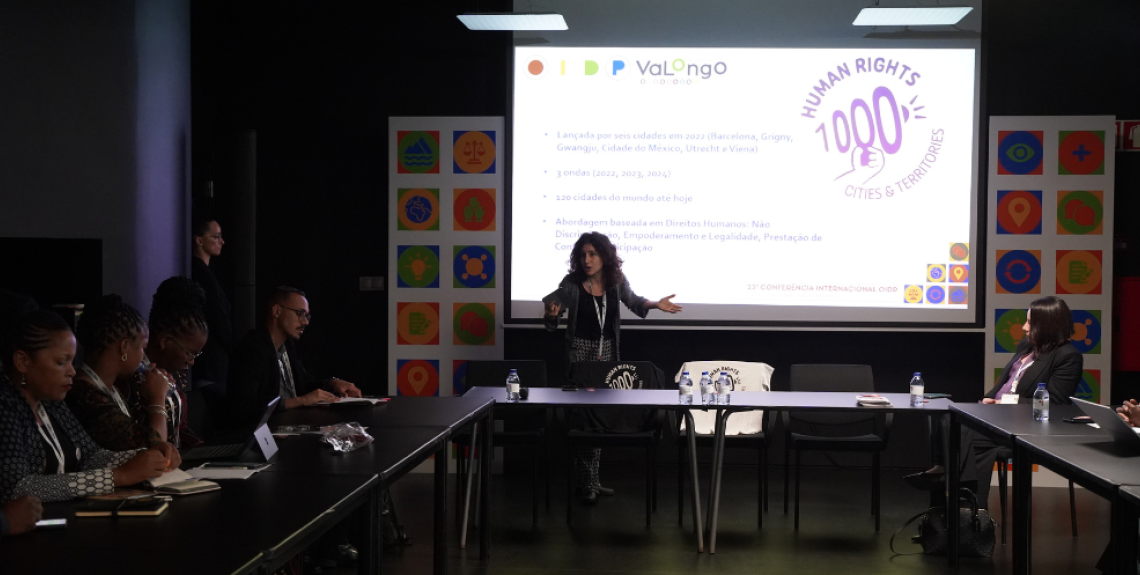As part of the 23rd Conference of the International Observatory of Participatory Democracy (OIDP), held on Friday, October 18, 2024 in Valongo, our Committee led a session aimed at giving impetus to the third wave of the "10, 100, 1000 Cities and Territories for 2030" global campaign, drawing on the experience of four local Portuguese-speaking territories in Brazil, Mozambique and Portugal.
Based on our Committee's 20 years of experience promoting dialogue around Human Rights Cities, this campaign aims to strengthen this movement and launch a global call for local action. The aim is to make this universal framework a reality for all inhabitants, whatever the size of the territory.
Click here to find out more about the campaign and how to participate
Promoting human rights through participation
Benedetta Cosco, UCLG-CSIPDHR Project Officer, showed how the global campaign has helped to identify the political priorities of over 100 members and define the promotion of human rights in cities. In this approach, the role of participation is essential: members of the global campaign guarantee human rights through social inclusion, empowering people and advancing principles of equality and non-discrimination. Thus, following the principles of the Gwangju Declaration, a “human rights city” is not an abstract concept but a way of conceiving the city; it represents both “a local community and a socio-political process where human rights play a key role both as fundamental values and as key principles” to guide public action.
Global Challenges and Gender Progress: The Experience of Geraldina Bonifácio, Mayor of Boane, Mozambique
Geraldina Bonifácio, Mayor of the commune of Boane, Mozambique, shared the specific challenges of promoting women's rights in her local context, where advancing gender equality and human rights is complex. Bonifácio highlighted the evolution of women's representation and participation in the municipal assembly and council, where a growing number of women hold decision-making positions.
She also drew attention to the impact of natural disasters and climate change on women's rights, particularly in Boane, a community facing an increase in extreme weather events, impacting the lives of residents and public infrastructure. The commune of Boane has strengthened the local response by creating two municipal observatories: the Municipal Youth Observatory and the Municipal Women's Observatory, dedicated to overseeing and protecting the rights of these populations.
Participation and Agenda 2030: The experience of Patrícia Marques, Open Government Coordinator in São Paulo
Patrícia Marques, coordinator of Open Government in São Paulo, shared how promoting human rights and participation are pillars for the realization of Agenda 2030 in her city. São Paulo has sought to concretize the human rights of specific groups, such as the Transcidadania Program, which supports the social and professional inclusion of trans people, the Bolsa Trabalho Program, which promotes youth employment and digital training, and Migrant Assistance.
One of the key participatory mechanisms in São Paulo's local politics are the city's 59 Public Policy Councils, which provide spaces to strengthen and shape communities active in decision-making, enabling all populations to make their voices heard and their needs visible.
Social Inclusion Mechanisms: the experience of Sílvia Silva, Head of the Social Development Division in Torres Vedras, Portugal
Sílvia Silva, head of the Social Development Division in Torres Vedras, Portugal, shared local mechanisms and projects that encourage integration and citizen participation. Ms. Silva detailed the Local Plan for the Integration of Roma and Migrant Communities, which facilitates the inclusion of these communities, as well as programs such as the Senior Club and Knowledge Workshops, which promote the lifelong learning and participation of the elderly.
Another notable project is “Digi-Inclusion”, which helps to reduce the digital divide among vulnerable populations, by promoting equitable access to technology. Torres Vedras is also committed to future generations with the Municipal Youth Council, a participatory mechanism designed to actively involve young people in the creation of public policies.
Towards more inclusive global communities
The session in Valongo clearly showed that commitment to a more inclusive and just society is a priority for the local leaders who are members of our campaign. The third wave of the “10, 100, 1000 Cities and Territories for 2030” campaign represents a crucial opportunity for cities and territories to make human rights real for millions of people through the promotion of participatory democracy and social inclusion. Join our global movement!


